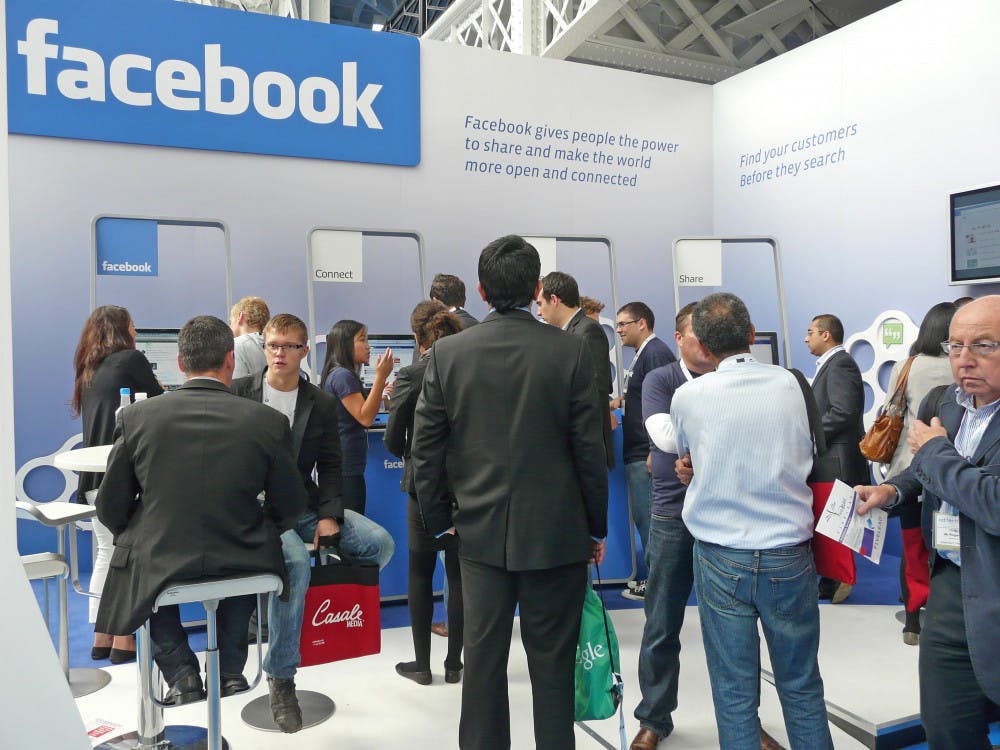Apple, Amazon, Google, Facebook and Microsoft. These companies are everywhere — in our homes and computers, in our schools and on our screens. They’re in places I never imagined they’d be. (Whole Foods? Really? Is nothing sacred?) They make life so, so easy. And, as The Herald’s 127th editorial board recently explained in an editorial, they have begun to face collective criticism for their lack of oversight. The seeds of this conflict were planted as far back as May, when New York Times columnist Farhad Manjoo labeled the aforementioned companies “tech’s frightful five.” Manjoo warned that the thin veneer of technology’s presupposed social good would eventually conflict with the companies’ overarching power, and here we are!
Large technology companies make me queasy, not because they aren’t good companies per se, but because their rapid growth and lack of accountability have the potential to cause great harm very quickly. For example, Snapchat has single-handedly gentrified and ruined Venice Beach with the construction of its new headquarters. Uber, which has always existed on the edge of ethical corporate practices, has started to experiment with self-driving cars on the roads of Pittsburgh. And don’t even get me started on the embarrassment of cities that are shamelessly pimping themselves out as potential sites for Amazon’s second headquarters. These companies, by way of money, power and prestige, operate outside of much of the oversight faced by traditional institutions like banks or the government. Too often, the industry is considered too “cool” and revolutionary to interfere with … doubleplusgood indeed. But like any other trend of complacency (remember the housing bubble?), we are finally coming to a reckoning: Tech companies like Facebook and Google have a lot to answer for with regard to their operations during the last election cycle, and I’m not happy with their responses so far.
I’m perhaps even more worried about the nonchalance that tech leaders continue to project even as these problems continue to escalate. Snapchat CEO Evan Spiegel, for example, still acts as if his headquarters is the greatest thing that has ever happened to the Venice Beach community (cue eye roll). Sure, eventually we can catch up to people like former Uber CEO Travis Kalanick, who was unceremoniously completely removed from power at Uber last month, but there are so many other leaders in tech who have gone unsupervised and remain remarkably uncaring of criticism. And the industry itself seems tone-deaf to the its critics: I’ve gone to a couple of tech recruiting sessions for the sheer fun of it and the free food, and the number of times I’ve heard the words “synergy,” “connect the world” and “social prerogative” make me groan.
And I realize the irony of critiquing these companies in a column that I have typed using Microsoft Word on a Macbook Air and with Google as my method of information-gathering. These corporations have done tremendous good — that much is true — but I refuse to use past successes (no matter how revolutionary) to justify ignoring the faults of these companies in the future. If we fall into this trap, we risk creating oligarchies, modern day equivalents of the phone and airline industries, which are universally hated by the public but nevertheless thrive on unchallenged. I will use Facebook all I want, but that does not deprive me of the ability to critique Mark Zuckerberg’s disastrous philanthropy attempts in New Jersey or his unchecked funding of misdirected science and education research. In fact, we should feel obligated to turn a critical eye toward these companies and their often questionable decisions.
This realization is important for everyone on campus, but especially for those who are considering internships and jobs at these companies after a particularly savage recruiting season. Let’s get some things straight: You are not changing the world, no matter what it says on your company T-shirt. Google is not just some hip, cool company operating out of a garage anymore, just as Harvard is not just some college in Cambridge. These companies have an army of public relations specialists and lawyers to make you feel special and important, to make you feel needed, so that they can scoop up your talent for their bottom line. But despite the massive demand for computer science professionals in the United States right now, what we really need is more ethical computer scientists. By ethical, I mean those who have the ability to discern for themselves the quality of their work and the consequence of their actions, rather than enter a mindless white-collar work culture. This morality is absolutely necessary, or else we end up with companies like Uber using advanced software to deceive and evade regulators. Tech is not necessarily a salvation, no matter how many people say it is.
A recent graphic illustration in the New York Times depicts a phone-wielding passenger at sea, stranded on rafts featuring the logos of these five companies. This image tells us all we need to know about the current state of the tech industry. Right now, the public views these companies positively, but their power and influence mean that any one of them has the capacity to hold us hostage, just like the phone companies and airline conglomerates before them. That’s not to say it’s too late to do anything. These companies are still led by smart, capable people, who should be able to read between the lines and change their policies while there is still time. They’re hiring from Brown, which means there have to be at least a few good apples in the ruthless recruiting pipeline. The only alternative to changing from within is government regulation, and that is a war I can’t even begin to fathom. Let’s not go there, shall we?
Mark Liang ’19 can be reached at mark_liang@brown.edu. Please send responses to this opinion to letters@browndailyherald.com and other op-eds to opinions@browndailyherald.com.





